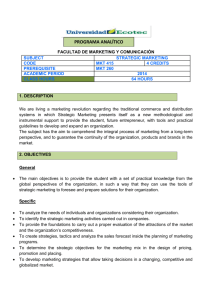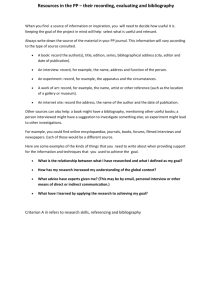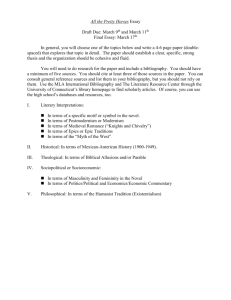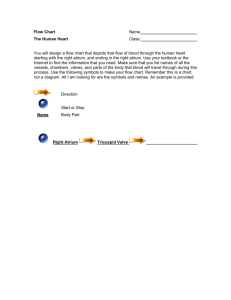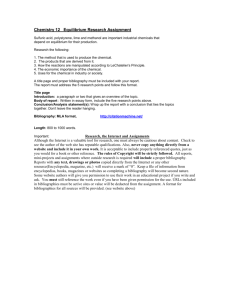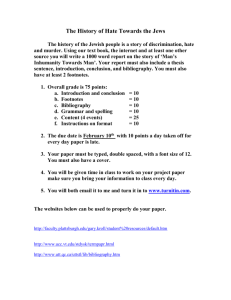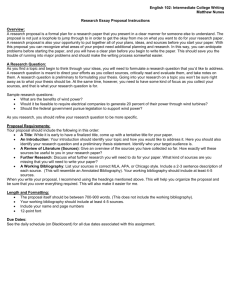programa analítico
advertisement
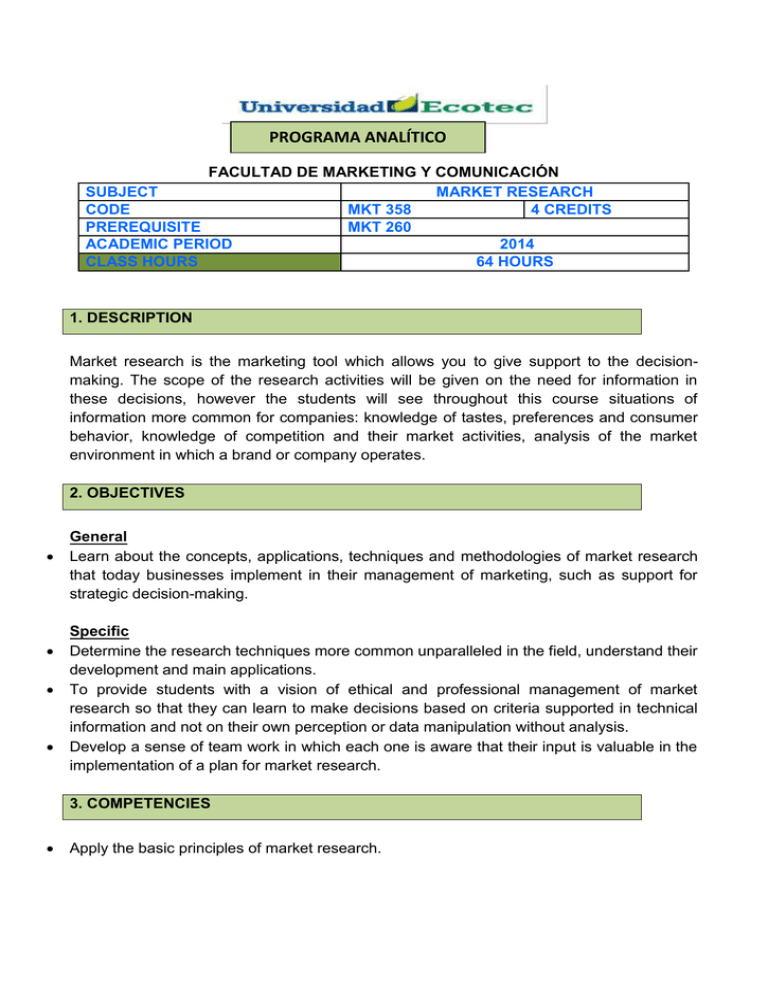
PROGRAMA ANALÍTICO FACULTAD DE MARKETING Y COMUNICACIÓN SUBJECT MARKET RESEARCH CODE MKT 358 4 CREDITS PREREQUISITE MKT 260 ACADEMIC PERIOD 2014 CLASS HOURS 64 HOURS 1. DESCRIPTION Market research is the marketing tool which allows you to give support to the decisionmaking. The scope of the research activities will be given on the need for information in these decisions, however the students will see throughout this course situations of information more common for companies: knowledge of tastes, preferences and consumer behavior, knowledge of competition and their market activities, analysis of the market environment in which a brand or company operates. 2. OBJECTIVES General Learn about the concepts, applications, techniques and methodologies of market research that today businesses implement in their management of marketing, such as support for strategic decision-making. Specific Determine the research techniques more common unparalleled in the field, understand their development and main applications. To provide students with a vision of ethical and professional management of market research so that they can learn to make decisions based on criteria supported in technical information and not on their own perception or data manipulation without analysis. Develop a sense of team work in which each one is aware that their input is valuable in the implementation of a plan for market research. 3. COMPETENCIES Apply the basic principles of market research. Relate the more current concepts and tools for planning, organization, direction, coordination and control, in the analysis of case studies. Plans, organizes, directs, coordinates and controls the process of research Plan, organize, direct, coordinate and control the process of market research. Propose criteria for the correct development of market research. 4. LEARNING OUTCOMES Cognitive Domain: Define market research and its methods of analysis. Identify the needs of a market and assess the different methods to be considered during on-the-field work. Recognize the importance of market research in the development of marketing strategies. Apply different evaluation methods to evaluate the effectiveness of strategies. Affective Domain: Practice collaboration among coworkers while collecting different types of data. Recognize the alternatives of cooperative and collaborative work for organizations and their personnel. Determine the key motivational factors for participation and active involvement of employees in market research. Psychomotor Domain: Design and develop market research programs in line with the individual and organizational objectives. Prepare a marketing research plan according to the needs of the organization. 5. METHODOLOGY The methodology to be applied will be based on the handling of tools and materials, with which extend the correct skills for the development of the research process and the analysis of results obtained. However some methodologies to be applied will have some commonalities with other materials, which are derived from the social constructivist model, which is based on the educational model of the University of Ecotec. For this reason it is favoring the participatory methods, including cases, combined with other active methods, such as gaming of roles, the problem, brainstorming, the development of workshops, debates, among others, by favoring in a systematic way the interaction of the students into groups, following the principles of cooperative learning (collaborative), in order to develop the competence of team work to deepen their knowledge of the central theme of the subject. To meet the challenge of knowing the world from our reality requires a positioning open (student-teacher) relational, dialogical and ethical, and raise a new form of address and constructing knowledge. The methods that contribute to discern, to talk, to interact with others, and the nature, to build the knowledge in the form of a cooperative, investigate, create and innovate, learn, unlearn and re-learn how, are: Study of cases Exhibitions Group learning by tasks Projects Learning from experience Discussions Videos Talks Learning to learn Collaborative work. The methodologies to be applied will have some common aspects, which are derived from the social constructivist model, which is based on the educational model of the University of Ecotec. For this reason we are favoring the participatory methods, including cases, combined with other active methods, such as gaming of roles, the problem, brainstorm, panels, Philips 16, among others, by favoring systematically the interaction of the students into groups, following the principles of cooperative learning (collaborative), in order to develop the competence of team work. In this methodological approach the teacher acts as a facilitator, which explores the prior knowledge that students have on the subject and guide the construction of the knowledge; individually and in groups, linking in a systematic way the theory with practice. Description of the type of work required At the beginning of the course there will be a research work sent which should be developed working in groups. The themes will be pre-approved, this will entail that they are updated and with projection for the future. Research work will be sent, which must be delivered according to the rules outlined in the Virtual Classroom. The drafting of documents, in terms of formats, letter, appointments, and the bibliography, will be according to the APA STANDARDS. Every fifteen days there will be personal or group work sent for the development of complementary activities to the classes, the working groups, both in class and outside, will be according to the number of participants in the classroom. The research work will be delivered according to the rules outlined in the Virtual Classroom. The drafting of documents in terms of formats, letters, appointments, and the bibliography, will be according to the APA STANDARDS. The work will be collected the following week of task sent at the start of the class and must be uploaded to the web from the atrium, the work necessarily must be developed on computer, by which the students must use Word, Excel and Power Point. Jobs sent should be presented with an introduction, development, conclusions and bibliography, with the insert determined by the university and be admitted from the Atrium in the tasks option. 6. CONTENT CHAPTER 1: MANAGEMENT STYLES AND MARKET RESEARCH. 1.1. Marketing Information Systems 1.2. Marketing intelligence 1.3. Definition of market research 1.4. Classification of market research 1.5. Motives for leaning about market research CHAPTER 2: THE PROCESS OF MARKET RESEARCH 2.1 Identification of the problems of the market 2.2. Market research and its image 2.2.1. Market research. Potential of the market 2.2.2. Market research and consumer characteristics 2.2.3. Market research and market participation 2.2.4. Market research, sales analysis 2.3. Process the research of the problem. Tasks involved in the investigation of the problem 2.4. Context of the problem (Factors to take into account) 2.5. Research of problem management and markets CHAPTER 3: DEVELOPMENT OF THE RESEARCH PLAN TO COLLECT INFORMATION 3.1 Types of research: 3.1.1. exploratory research 3.1.2. Conclusive Investigation: Descriptive and causal 3.2. Plan for the collection of primary data 3.2.1. The focus of the research: observation, Survey, experiment 3.2.2. Contact methods: Email, phone, personal, on-line. 3.2.3. Sampling Plan: How should the sample be selected. Types of probability sampling 3.2.4. Research Tools for primary data gathering 3.2.4.1. Questionnaires 3.2.4.2. The mechanical tools CHAPTER 4: IMPLEMENTATION OF THE PLAN OF THE MARKET 4.1. Collection of the research data 4.2. Analysis and interpretation of the data collected 4.2.1. Information processing 4.2.2. Tabulation Plan 4.2.3. Tabulation of the information 4.2.4. Statistical conclusions 4.2.5. Precision of the tabulation CHAPTER 5: DEVELOPMENT OF THE REPORT OF THE MARKET RESEARCH 5.1. Steps for the development of the report of markets 5.2. Methodology of the report of markets. 7. EVALUATIÓN Criteria for grading of classwork and homework The presentation of classwork and homework is mandatory. Noncompliance of this requirement will be sanctioned. Homework assignments must be presented with an introduction, main body, conclusion and bibliography, with the insert determined by university and the tasks must be admitted into the Atrium in the tasks option. The minimum grade for passing the course is 70. All exams will be taken on the date previously established by the Director of the Language Department. No exams will be given ahead of this date or postponed for a later date without the expressed written permission from the Academic Commission of the faculty to which the student in question belongs; in which case, a make-up exam will be given Grade Breakdown Activities 30 Exam 1 15 Exam 2 15 Final Exam 40 Total Grade 100 8. MATERIALS TEXT Investigación de mercados Sistemas de información AUTHOR Joseph Hair Kenneth Laudon PUBLISHER Mcgraw Hill México. Prentice Hall 9. COMPLEMENTARY MATERIAL TEXTO Introducción a la investigación de mercados Marketing Estratégico www. Promonegocios.net E-learningmarketing.blogspot.com AUTOR Marcela Benassini Jean-Jacques Lambien Ivan Thompson 7 Realizado por: EDITORIAL Pearson McGraw Hill 2007 Fecha: MBA. Rita Pimentel DECANA DE FACULTAD Revisado por: Fecha: Gilda Alcívar Ms.C. VICERRECTORA ACADÉMICA
